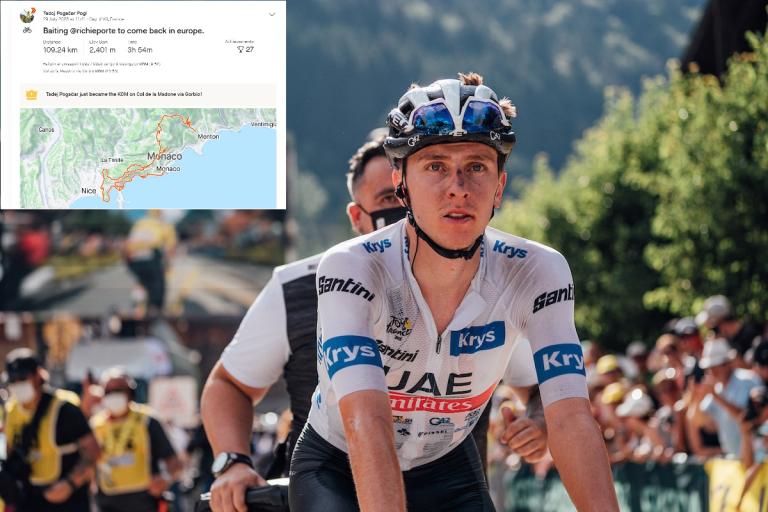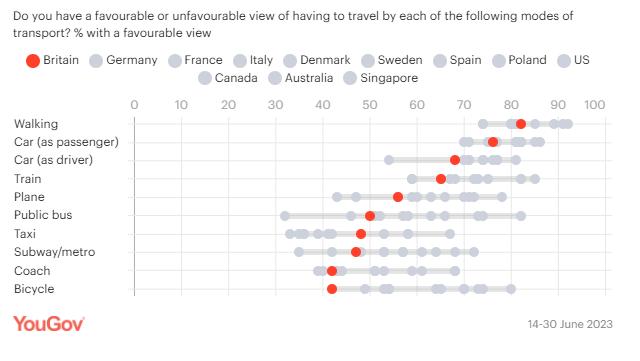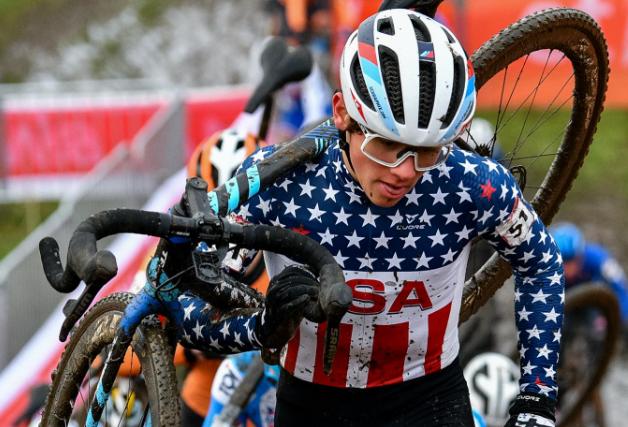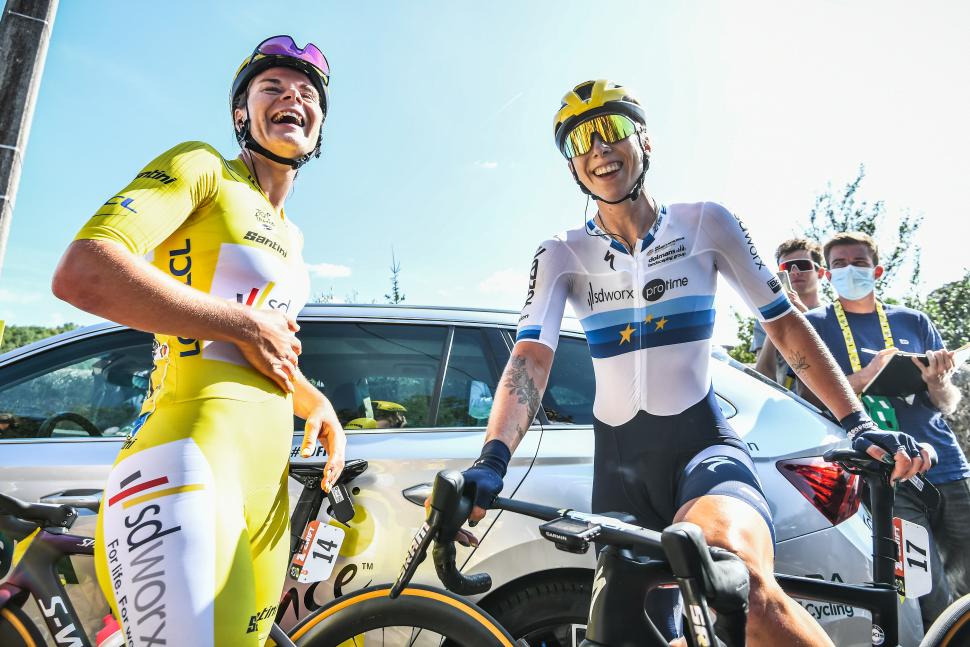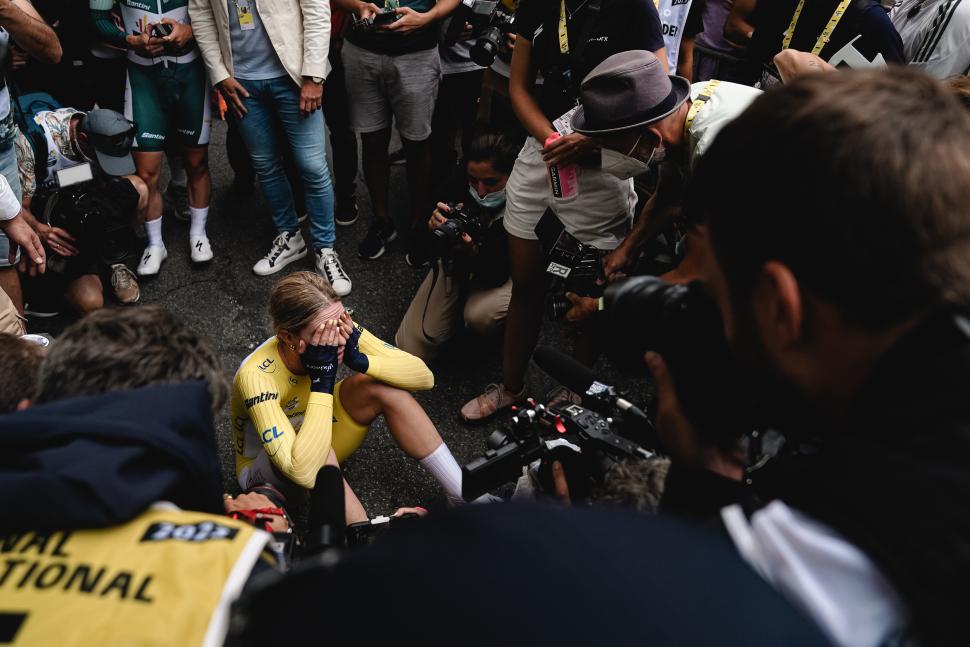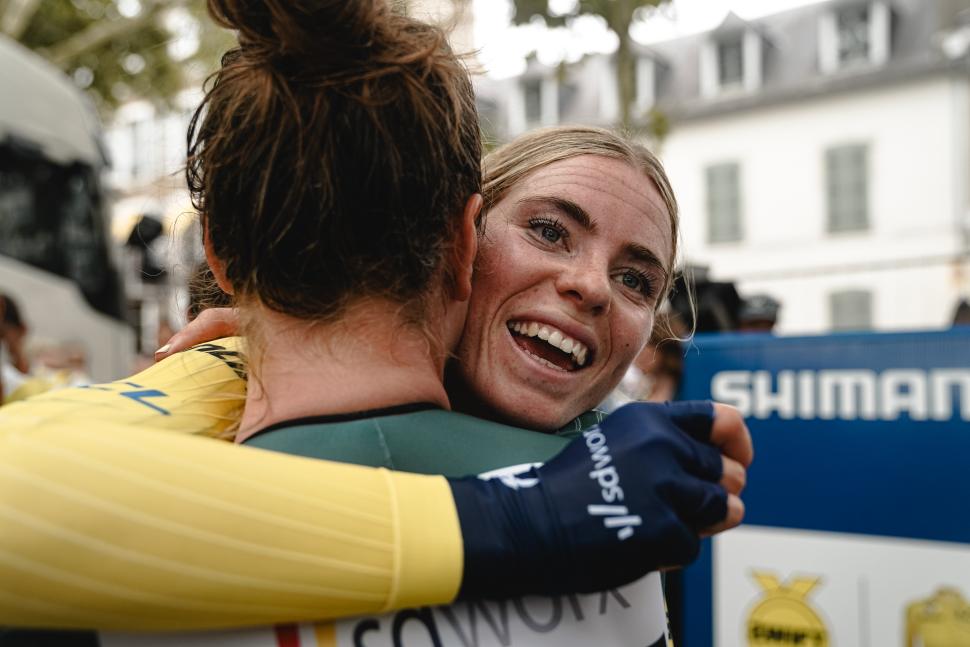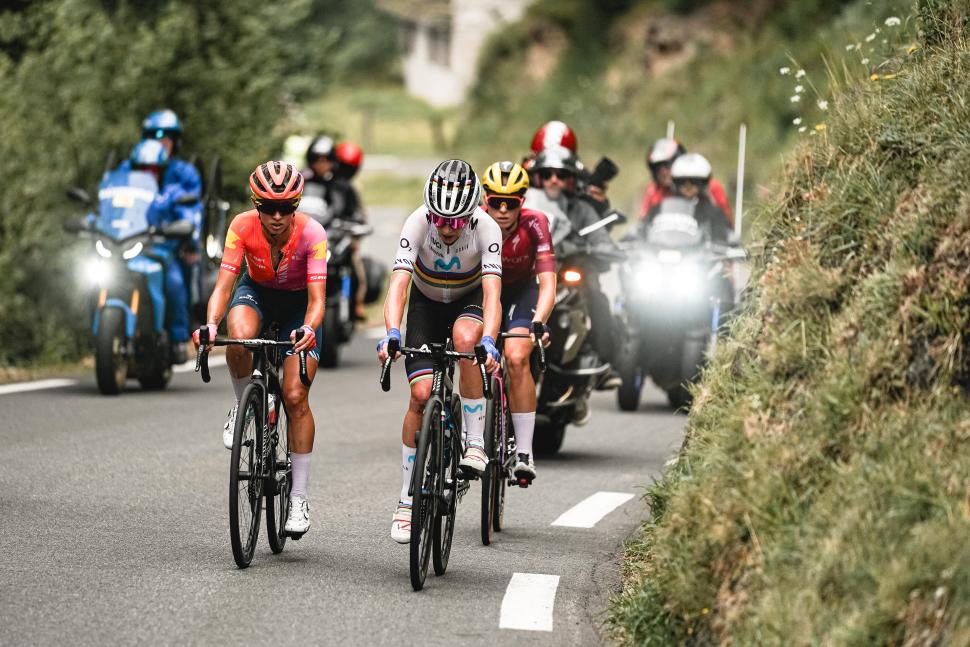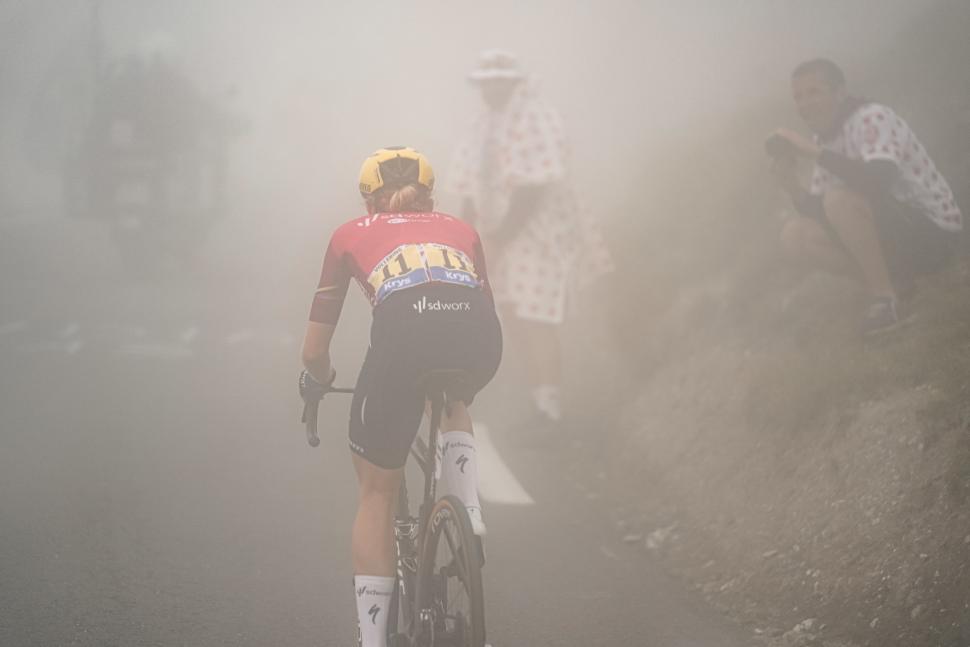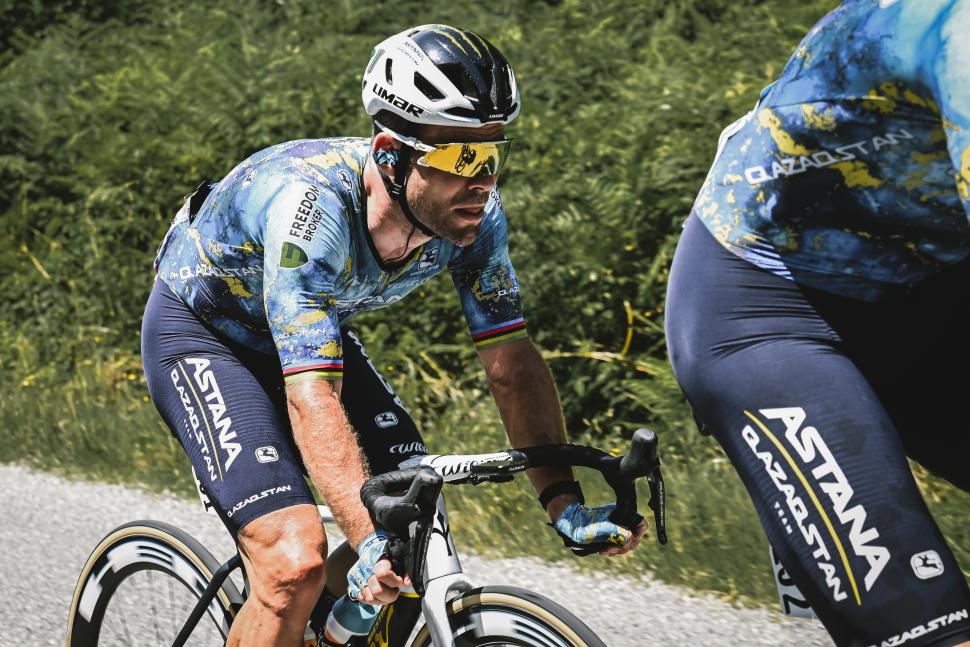- News
- Reviews
- Bikes
- Accessories
- Accessories - misc
- Computer mounts
- Bags
- Bar ends
- Bike bags & cases
- Bottle cages
- Bottles
- Cameras
- Car racks
- Child seats
- Computers
- Glasses
- GPS units
- Helmets
- Lights - front
- Lights - rear
- Lights - sets
- Locks
- Mirrors
- Mudguards
- Racks
- Pumps & CO2 inflators
- Puncture kits
- Reflectives
- Smart watches
- Stands and racks
- Trailers
- Clothing
- Components
- Bar tape & grips
- Bottom brackets
- Brake & gear cables
- Brake & STI levers
- Brake pads & spares
- Brakes
- Cassettes & freewheels
- Chains
- Chainsets & chainrings
- Derailleurs - front
- Derailleurs - rear
- Forks
- Gear levers & shifters
- Groupsets
- Handlebars & extensions
- Headsets
- Hubs
- Inner tubes
- Pedals
- Quick releases & skewers
- Saddles
- Seatposts
- Stems
- Wheels
- Tyres
- Health, fitness and nutrition
- Tools and workshop
- Miscellaneous
- Cross country mountain bikes
- Tubeless valves
- Buyers Guides
- Features
- Forum
- Recommends
- Podcast
news
“Tell ‘em Marlen”: Cyclist berates van driver… on the way to winning Tour de France time trial; Cyclists constantly riding through red lights on bike lane – because they won’t turn green; Tour de France Femmes recap: End of an era? + more on the live blog
SUMMARY
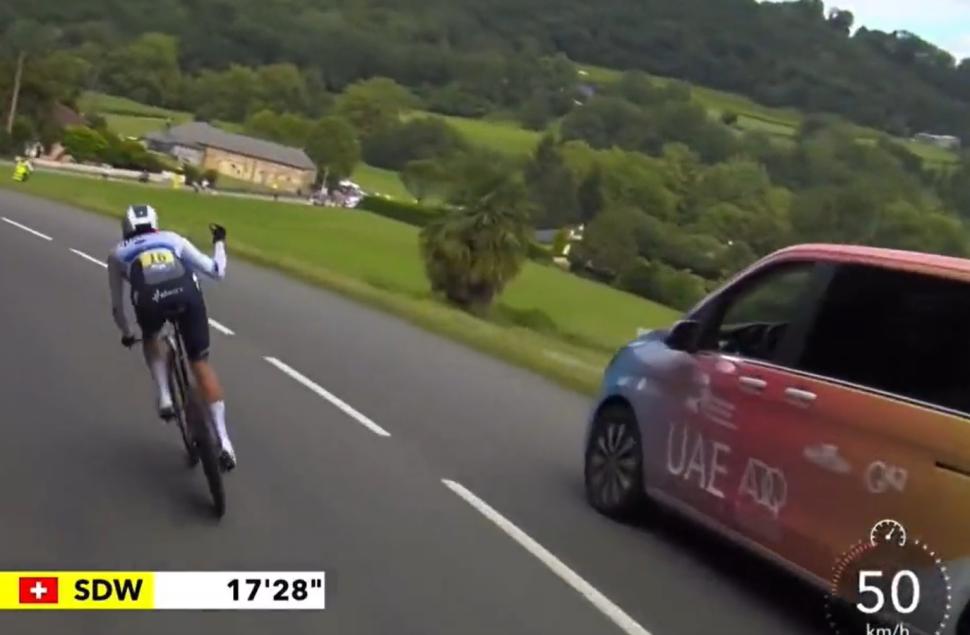 Marlen Reusser held up by UAE team van during Tour de France Femmes time trial (GCN)
Marlen Reusser held up by UAE team van during Tour de France Femmes time trial (GCN)31 July 2023, 08:04

“Tell ‘em Marlen”: Cyclist berates van driver… on the way to winning Tour de France time trial
Now, obviously I wish it weren’t so, but sometimes – sometimes – tensions can arise and things can get a little heated on the roads, especially between cyclists and motorists (though you probably already know that if you read this website).
So, it’s not unusual, then, after a spot of poor or dangerous driving, to see a cyclist look across at a van driver, for example, and direct some choice words and a derisory hand gesture towards them.
It is a bit unusual, however, to see such an interaction taking place in the middle of a Tour de France time trial.
🚴🇫🇷 | Reusser is bezig met een enorm snelle tijdrit. Zo snel zelfs dat ze in de weg wordt gereden door een bus van UAE en een motard #TDFF2023
📺 Koers kijk je op discovery+ pic.twitter.com/gOcCiihER3— Eurosport Nederland (@Eurosport_NL) July 30, 2023
But that’s what happened during yesterday’s final stage of the Tour de France Femmes, a 22km loop around Pau, when red-hot favourite Marlen Reusser – flying down the route’s main, tricky, narrow descent – was held up by the driver of a van following UAE Team ADQ’s Eleonora Gasparrini.
While it wasn’t the first time during the Tour that a SD Worx rider was caught behind a team vehicle (looking at you, Danny Stam), this particular impromptu traffic jam slowed down Reusser, forcing the Swiss rider to wave and shout frantically to ensure the van driver – using the larger vehicle, presumably, because the rest of the team’s cars were out on the course – would give her enough room to pass.
(Yes, a van driver holding up a much faster cyclist – what would the Daily Mail think?)
By the time Reusser managed to pass the driver, let’s just say she wasn’t too happy with the whole situation…
tell him Marlen #TDFF2023 pic.twitter.com/N2t97LASWc
— Emma Bianchi 🩵 #SiempreGino (@cyclartist) July 30, 2023
On the Eurosport motorbike, Iris Slappendel described the UAE driver as “amateurish” (I’m sure Marlen’s choice of words would have been stronger), while fans on social media said the whole situation was “unacceptable”.
The only way to stop Marlen Reusser is obiously a car. Not cool UAE! #TDFF2023 #WatchTheFemmes
— Rafael (@Rafael_Nala) July 30, 2023
Also the entire nation of UAE is so lucky Marlen won because I and everyone else in the world would’ve filed a lawsuit.
— Leslie Ethridge (@leslie_ethridge) July 30, 2023
Luckily (for the UAE driver, mostly), Reusser’s brief hold-up on the descent wasn’t enough to stop her winning the stage – her second in two years at the Tour Femmes, setting herself up nicely for next week’s worlds TT in Stirling – though SD Worx teammate and overall winner Demi Vollering did, naturally, run her close…
Marlen Reusser watching fellow team mate and yellow jersey wearer Demi Vollering nearly breaking her time at the intermediate sprint. “Go fast, but not too fast, Demi!” pic.twitter.com/trBaUON3MV
— Team SD Worx (@teamsdworx) July 30, 2023
Judging by her ride up the Tourmalet and in Pau, “Demi, go fast but not too fast” may be the mantra of the entire peloton over the next few years…
31 July 2023, 15:34
31 July 2023, 11:26

Those pesky cyclists, always riding through red lights… Oh wait, they’re always red: Cyclists say bike lane lights permanently stuck on red are “more dangerous than what was there before”
Angry motorists who love banging on about cyclists always jumping red lights, here’s a story just for you… (but wait, there’s a twist.)
A new cycle lane in Newcastle has been come in for criticism from local cyclists – because is traffic lights appear to be permanently stuck on red.
While the lights for motor vehicles on Heaton Road, one of the city’s prime active travel spots thanks to its cycling infrastructure, do change as normal, cyclists using the new segregated bike lane are forced to ride through on red.
Just wanted to pop up to say I freakin' love Heaton Road 😍
Walking along today we were passed by so many people on bikes. No helmets, no special clothes (except for the vicar 😄) Folk smiled and said hello. Kids wheeling on the cycle lane so they could chat to their mates.
— icouldntcarless (@icouldntcarless) May 5, 2023
Father Jonathan Lawson, a vicar at St Gabriel’s church in Heaton, told the BBC that the non-functioning lights have made the bike lane “more dangerous than what was there before”, and that cyclists are now having to “take a risk” when crossing at side roads.
“I have a hunch that it’s been wired incorrectly, as the traffic lights turn red regularly on Heaton Road even when there’s nothing waiting at Rothbury Terrace, which seems odd for brand new traffic lights,” Fr Lawson said.
“So they also cause extra congestion and pollution and a greater hazard for cyclists.”
He added that the current situation was sending “a message to young people and adults that it’s alright to cycle through red lights”.
Nice!
The new bits of Heaton Road (going North, then South)@NewCycling pic.twitter.com/5rWaelv9ks
— Jim Stanton (@jstantn) April 25, 2023
(The cycle lane before the lights turned red…)
Local cyclist Sebastian Popa also said that he rides on the bike lane up to three times a day and has never seen the lights turn green.
He also said that he was not surprised the lights were not working, as “it took forever” to finish the cycle lane, with residents complaining that the finished infrastructure has unnecessary sharp turns and gaps.
Responding to the non-functioning bike lane on Heaton Road, Cycling UK’s Keir Gallagher pointed out that a council’s responsibility for cycling infrastructure “does not end once it’s been built”.
“Whether it’s gritting, road debris, and defects, or faulty traffic lights, these are issues which impact on people’s safety and need to be addressed swiftly just as they would on a main road,” he said.
31 July 2023, 15:15
And… they’re back! Green lights return to Newcastle cycle lane
Spoiler. pic.twitter.com/mbD3Y3rSta
— Mike Cookson 🇪🇺💙💜🔶 (@cookson_mike) July 31, 2023
Ah, that’s more like it… Cycling infrastructure working exactly like it’s supposed to – what a novelty concept.
31 July 2023, 14:47

Surprise, surprise: New survey of twelve countries reveals British people are most likely to be against cycling
In perhaps the least surprising news of the day so far – cheers, Rishi – a new international YouGov survey has revealed that, out of 12 countries worldwide, people in the United Kingdom are least likely to have a favourable view of riding a bike.
According to the survey – which looked at how people view different forms of transport in several European nations, as well as the US, Canada, Australia, and Singapore – British people had the most negative view of travelling by bike, with the UK being the only country surveyed where more people had a negative view of cycling than positive (with 46 percent holding a negative view, compared to 43 percent positive).
Meanwhile, in Poland, 80 percent of those surveyed were in favour of getting around by bike.
Perhaps surprisingly, walking actually topped the list of methods of travel according to British people, ahead of being in a car as a passenger and a driver.
Well, I suppose it could be worse – we could be in the US, where travelling in a car topped everything else as the most preferred way to travel. I’m shocked, shocked I tell you…
31 July 2023, 14:18
Jake Stewart sprints to second pro win at the Tour de l’Ain
Jake Stewart certainly likes the Tour de l’Ain, doesn’t he?
This time last year, the sprinter from Coventry took an emotional first professional victory on the opening day of the French stage race, putting behind him a miserable start of a season derailed by intestinal issues.
🏅🇬🇧Jake Stewart (Groupama-FDJ) gana la ETAPA 1 del Tour de l'Ain 2023 🇫🇷#TDA2023 #TourdelAin pic.twitter.com/lTke44wmly
— NotiCiclismo ➡ 🇵🇱 #TdP2023 (@Noticiclismo1) July 31, 2023
And now, 12 months later, on the first stage of the 2023 edition, the 23-year-old – who sprinted to two top ten placings at this year’s Giro d’Italia – has only gone and done it again, launching early after a textbook lead out from Groupama-FDJ teammate Rudy Molard to comfortably see off the late-charging Emmanuel Morin and Nacer Bouhanni, and claim the second win of his career (Déjà vu, anyone?).
Same place, same time next year, okay Jake?
31 July 2023, 13:55
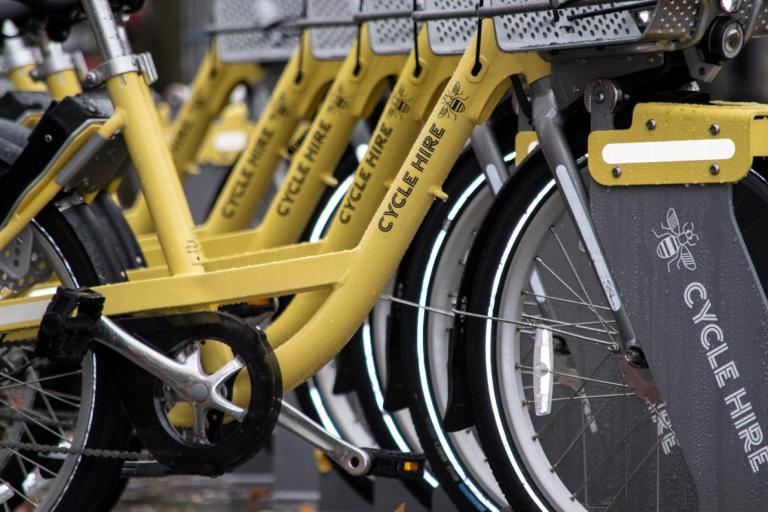
“It’s not a case of use it or lose it, it’s a case of just look after it, everybody”: Greater Manchester cycle hire scheme scaled back, as 800 of the network’s 1,000 Bee Bikes damaged or missing
Greater Manchester’s cycle hire scheme is currently being scaled back following a spate of vandalism which has taken around 800 of the 1,000 bikes previously available off the road, the Manchester Evening News reports.
Just 160 Bee Bikes were available to hire earlier this month, though transport bosses are hoping this will rise to 500 – half of the original network – by the end of August.
To ensure the reduced service runs smoothly, Transport for Greater Manchester – which owns and manages the Bee Network Hire Scheme – is also temporarily closing more than 1,000 bike stands across the region (a 40 percent reduction), in a bid to increase the availability of bikes at the stands which remain open. These bike stands will predominantly be available where demand is highest, such as Manchester city centre, for a scheme with almost 65,000 users.
> Vandalism hits Greater Manchester’s cycle hire scheme again
Greater Manchester mayor Andy Burnham said that scaling back the scheme means it can be built back up “in a manageable way”.
“Some docking stations are being temporarily suspended, but that’s necessary to bring bikes back to the places where they’re most used,” Burnham said. “So the sites that are being suspended, I think, are having very few rides per day.
“Actually, the scheme has not yet fully landed in those places from a positive use point of view and it’s in those places where some of the negatives is outweighing the benefits. So there’ll be a temporary suspension there.
“But the aim will be to bring the bikes back there. It’s not a case of use it or lose it, it’s a case of just look after it, everybody. The more we all look after it the more it will all be there for everyone.”
Transport for Greater Manchester hopes to combat the swathes of vandalism hitting the scheme – five years after dockless bike hire operator Mobike pulled out of the city-region, citing similar anti-social behaviour – by introducing new locking rules and heavier fines for those who do not properly return the bikes.
31 July 2023, 13:38
It’s happening! It’s happening!
So, it’s official: Tadej Pogačar will be in Glasgow this weekend for the world road race championships…
It is official 🇸🇮 @tamaupogi is going to @CyclingWorlds World Championship 2023 in Glasgow!
Cycling @TeamSlovenia is going to be the strongest by the number of Slovenian cyclists, mountain bikers and BMX riders in history! #ifeelsLOVEnia #sloveniaoutdoor
📷 @AlenMilavec pic.twitter.com/Op4iOMnd2B
— Feel Slovenia (@SloveniaInfo) July 31, 2023
Now we know what that Col de la Madone KOM was all about…
31 July 2023, 12:26
“Does it mean we need to have a big cycling event for them to fix our roads?”
Ah, I see the world championships pothole debacle is continuing to rumble on, with one MSP describing the recent, apparently selective, repair works in Glasgow as a “kick in the teeth for motorists”…
31 July 2023, 11:53
Tadej Pogačar’s status as the peloton’s top troll remains intact
He may have just finished an intense, physically and emotionally exhausting Tour de France, and is currently in the middle of a ‘short break’, but that doesn’t mean Tadej Pogačar is letting up on his world-class trolling efforts.
Pogi once said that Twitter is more for trolling and Instagram is for nice pics. To what category does Strava belong? Porte was KOM holder of Col de la Madone until Saturday, when Pogacar took it over.
Strava file: https://t.co/AGdThgspvO (spotted by @eliott_aime) pic.twitter.com/ZzdSv42CY8
— ammattipyöräily (@ammattipyoraily) July 30, 2023
Only the Slovenian would set a new Strava KOM on the Col de la Madone (that famous form test near Nice) just so he could crack a joke at Richie Porte’s expense.
Okay, okay, that’s obviously not the only reason he’s decided to blitz his way up the Madone, a week out from the worlds road race, but I’m sure it at least forms part of the reason.
Anyway, we can now cut to live footage of Pogačar at the summit of the Madone…
31 July 2023, 10:58
Awful news, as promising American teen Magnus White is killed in a collision just days before worlds
A promising 17-year-old cyclist due to represent the United States at the UCI Cycling World Championships in Scotland next week has been killed in a collision while training ahead of the event.
USA Cycling last night confirmed the tragic news, saying that Magnus White had died after being “struck by a car” while he was cycling near his home in Boulder, Colorado.
Read more: > Promising teenage cyclist killed in collision just days before World Championships
31 July 2023, 10:38
And now for the best part of yesterday’s time trial… THOSE St Michel biscuit wheels
Voilà. #TDFF2023 | 📸 @DevaireAuguste pic.twitter.com/W1AOB97CXA
— St Michel - Mavic - Auber93 🍩 (@Auber93Cyclisme) July 30, 2023
That’s it, St Michel-Mavic-Auber93 have won cycling, it’s done…
31 July 2023, 09:59
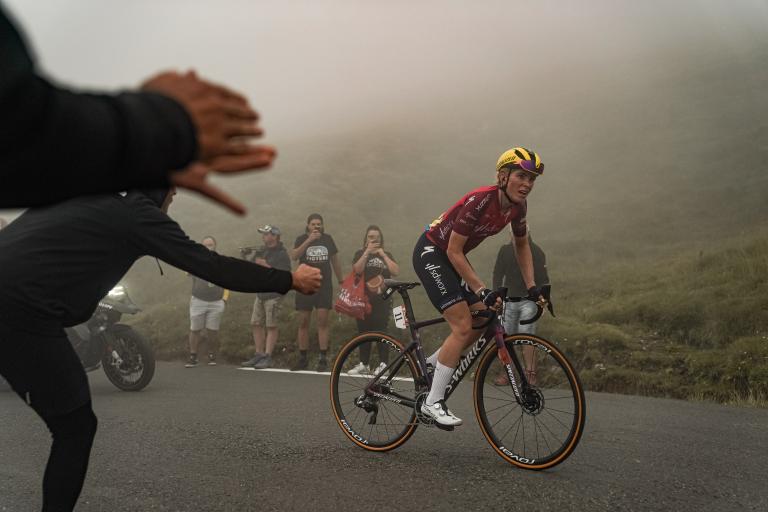
Tour de France Femmes recap, part two: SD Worx’s chaotic brand of dominance pays off as new era begins
In many respects, Demi Vollering’s Tour de France-winning ride through the dense fog on the Col du Tourmalet summed up SD Worx’s entire race.
When the 26-year-old finally emerged through the clouds as she crossed the line, her dominance – serene, confident, seemingly inevitable – was clear. It’s just that it was hard to actually see it until the finish line.
Such was the fog that surrounded what, in the end, proved to be the perfect Tour de France for SD Worx, the sport’s most powerful squad.
(A.S.O./Charly Lopez)
Four stage wins (out of eight), courtesy of four different riders, the entire Tour holding the yellow jersey, a one-two-three in the final time trial in Pau, the points classification, the GC, and a one-two on the overall podium, thanks to Vollering and the race’s surprise package, classics star Lotte Kopecky, whose performances in the sprints, on the TT bike, and in the 2,000m-plus mountains of the Pyrenees has certainly placed herself alongside compatriot Wout van Aert and Tadej Pogačar in the pantheon of cycling’s great all-rounders.
Simple, then.
However, despite the dominance implied on the results sheet, SD Worx’s Tour was confusingly chaotic.
First, there was the debacle that surrounded the team’s refusal to work on the front of the bunch on the early flatter stages – despite ostensibly defending Kopecky’s yellow jersey and Vollering’s GC place, while also possessing by far the fastest sprinter in the race in Lorena Wiebes. But still, SD Worx refused to budge, and left the chasing up to the others.
That was the first tick of the box in the unpopularity stakes.
(A.S.O./Thomas Maheux)
Then, draftgate happened – and while Danny Stam’s dangerous driving and Vollering’s questionable interpretation of the rules were bad enough, the squad made matters worse through their ill-judged reaction in the media to the commissaires’ decision to dock Vollering 20 seconds. Not the best look.
Vollering’s very un-PR-like responses to questions continued to plague the team even after Stam’s dismissal from the race, as the eventual Tour winner again courted controversy for claiming that other teams “lack respect” – by not opening gaps for her and her teammates in the bunch.
And, all the while SD Worx seemed to play up their pantomime villain role at this year’s Tour, there was also the lingering suspicion that – by focusing so strongly on the Tourmalet stage on the penultimate day – the team saw opportunities for further stage wins slip through their grasp, as the breakaway enjoyed unprecedented success in the second half of the race.
(A.S.O./Thomas Maheux)
Of course, not that all this social media muttering matters one bit to SD Worx. They’re the biggest and most successful team in the world, and they underlined that at this year’s Tour, chaos and drama notwithstanding.
And all that talk about popularity and rubbing people up the wrong way? It won’t leave even the faintest stain on Vollering’s yellow jersey.
31 July 2023, 09:28
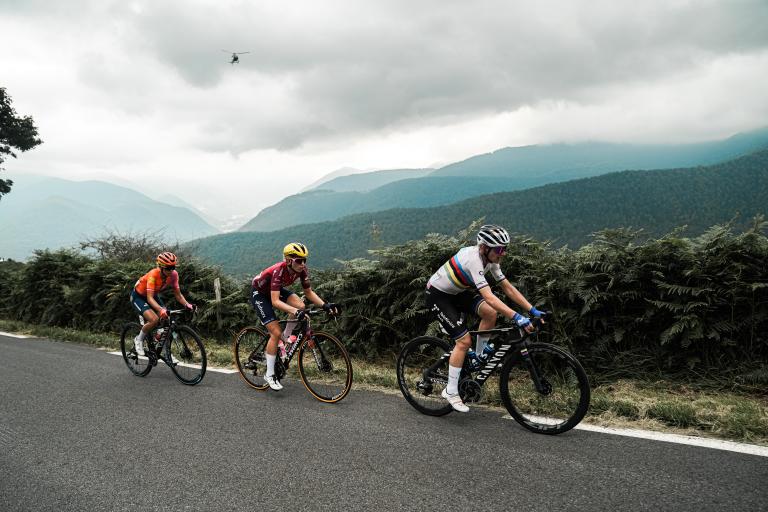
Tour de France Femmes recap: The Queen is dead, long live the Queen
To paraphrase Ernest Hemingway, the changing of the guard in professional cycling – from one era dominated by a seemingly unbeatable, standard-setting superstar to another – happens in two ways: gradually, then suddenly.
The passing of the baton from Annemiek van Vleuten, the 40-year-old credited, over the past five or so years, with almost single-handedly raising the standards and expectations of women’s cycling, to her compatriot Demi Vollering was, indeed, a gradual one at first.
Last year, Van Vleuten still reigned supreme: a Giro, a Vuelta, a scintillating, against-all-odds world road race title, and – of course – that maiden Tour triumph amounting to one of the great all-time seasons.
But, as the Movistar rider ticked over into her 40s, and with retirement on the horizon, the first few months of 2023 saw the early signs of crumbling within one of the sport’s most stoic empires. As Van Vleuten struggled to click into gear, Vollering was, along with teammate Lotte Kopecky, the rider of the spring, taking wins at Strade Bianche, Amstel, Flèche, and Liège-Bastogne-Liège as her SD Worx squad devoured everything in sight.
But as I say, these things happen gradually, and the world champion wasn’t ceding her place at the top of the sport without a fight. A gritty, tactically astute, and controversial attack in the crosswinds saw Van Vleuten claim the Vuelta ahead of a devastated Vollering, who, terribly timed pee stop aside, was certainly stronger than her rival on the race’s big climbs, just without the jersey to show for it.
(A.S.O./Thomas Maheux)
A convincing win at the Giro Donne earlier this month for Van Vleuten also served to slow what seemed for most of the first half of 2023 to be the relentless acceleration of time. By the time the Tour got underway in Clermont-Ferrand, to misquote another American author, it appeared that rumours of the defending champion’s demise were greatly exaggerated.
But then, with one final trademark act of what turned out to be attacking hubris on the Col d’Aspin on Saturday, followed by a pained sprint, an even more pained thud back into the saddle, and a resigned shake of the head, one era suddenly ended and a new one began through the dense fog on the top of the Tourmalet.
As Vollering serenely tapped out her path to greatness, Van Vleuten – whose style at the best of times is one of blunt force – was ragged, her eyes hollow, her face a picture of untold suffering. By the end of the following afternoon in Pau, the changing of the guard was complete.
(A.S.O./Thomas Maheux)
And, as if to underline the point, Vollering’s rampaging teammate Lotte Kopecky ensured that Van Vleuten – who only came to win, anyway, like she always seems to do – wouldn’t even make the final podium, her regicide fully complete.
Reflecting on what may be regarded as the end of the reign of one of the sport’s most exciting talents, a disappointed Van Vleuten said after the final stage: “Of course, there's disappointment that I was not good the last two days. I was in the battle and gave it my all. I didn’t make any mistakes, or think that I was not smart or that I did something wrong.
“I don’t know what happened, I was obviously not myself. And that’s a bit sad for my last Tour de France. I don’t know what happened.”
The Dutch Queen of cycling is dead, long live the Queen.
31 July 2023, 08:56
Weekend roundup
Away from the changing of the guard at the Tour de France Femmes (which we’ll get back to in a minute), here’s what you may have missed on road.cc over the weekend…
> Rishi Sunak accused of seeking to exploit division over LTNs as he orders review of schemes
> Brexit blamed as London-Paris organisers say next year’s edition will be the last
> Family of cyclist who went missing on charity ride to sue driver who killed him then hid body
> Mark Cavendish wants his Netflix documentary to boost mental health awareness
> Jail for speeding driver who killed teenage cyclist and fled scene
After obtaining a PhD, lecturing, and hosting a history podcast at Queen’s University Belfast, Ryan joined road.cc in December 2021 and since then has kept the site’s readers and listeners informed and enthralled (well at least occasionally) on news, the live blog, and the road.cc Podcast. After boarding a wrong bus at the world championships and ruining a good pair of jeans at the cyclocross, he now serves as road.cc’s senior news writer. Before his foray into cycling journalism, he wallowed in the equally pitiless world of academia, where he wrote a book about Victorian politics and droned on about cycling and bikes to classes of bored students (while taking every chance he could get to talk about cycling in print or on the radio). He can be found riding his bike very slowly around the narrow, scenic country lanes of Co. Down.
Add new comment
19 comments

AlsoSomniloquism
|
1 year ago
1 like
Re: Permanent Red lights on a cycle route.
These ones on the A34 cycle lane in Brum have two quirks.
1: If you approach them from the route in the picture going into Brum, unless you come off the cycle route onto the pavement by a metre, the "detector" doesn't detect you so they will stay red for cyclists.
2: If a pedestrian presses the beg button to cross, the lights stop for the line of traffic for the side they are on, not for the whole route. However, said pedestrian lights also overrule the timings for the cyclist who approaches them so if going across, you have to wait 2 to 3 minutes before they might change again. I'm guessing as the cyclist could in theory turn up that road off the cycle path and across the crossing, that is the reason, however they could always have kept them red for cars and turn green for cyclist once the ped lights have finished but they don't.

chrisonabike
|
1 year ago
0 likes
Mostly good with the Heaton cycle lane however an aside - the UK designs appear much more fussy than in NL when crossing very minor side roads. (We just don't seem to get this "continuous footway" business in the UK.)
It's difficult to judge / see here because of camera angles / lenses but the Heaton one and the Edinburgh one (Roseburn Terrace) seem to swing one way, then the other more abruptly than in many Dutch cases I've seen. (We have wobbly paths elsewhere e.g. Leith Walk - is it a deliberate "how can we slow down those dangerously fast cyclists?")
The Dutch example in the bottom image does divert cyclists but there's already some space because of the nice wide grassed buffer. It certainly leaves plenty of waiting space for a vehicle joining / leaving the main road, but the side road seems to be busier. Certainly in Edinburgh (middle image) I have almost never encountered a motor vehicle here and yet we've got a massive area for vehicles waiting to cross the cycle path - and indeed beyond that.
Is this to help our drivers who otherwise might just ignore it as usual - or maybe give those confused somewhere to stop out of the way of other drivers while they work things out?
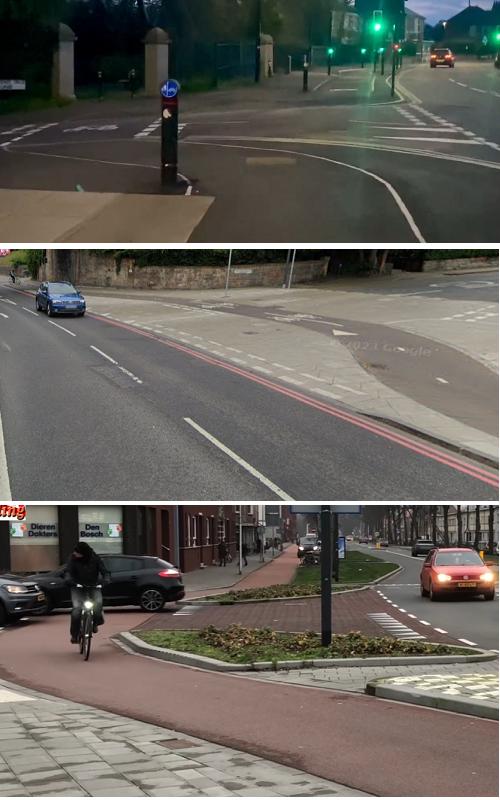

stewcelliott
|
1 year ago
6 likes
Re; The YouGov survey
Maybe I'm being naive here but taken alongside other polling that shows at least a healthy plurality of people would like to cycle more for their day to day but are too fearful to do so and the question was about *travelling using that mode* rather than the mode itself, is it not possible that at least some of the people with negative views of cycling are just expressing an entirely rational response to something most local authorities seem to be going out of their way to make as dangerous and unattractive as possible?

Not naive at all, I think you're spot on: the question was "Do you have a favourable or unfavourable view of having to travel by each of the following forms of transport?" A person could be mad keen to be able to cycle but still have an unfavourable view of having to travel by bicycle due to the lack of provision and dangerous roads in their area. Responding "unfavourable" to that question does not necessarily imply an unfavourable view of cycling or cyclists or indeed a disinclination to cycle oneself in more propitious circumstances.

Awavey
|
1 year ago
2 likes
the only pantomime villains in the TdFF, were the ones created by a bored media who were looking for angles to cover the story. It was obvious from the day the route was first announced the Tourmalet stage was the key to the whole race, not just a MTF where climbers would excel, but literally whoever won the stage would win the race, and so stage hunting the whole race wasnt going to be the way to win it if you were expending lots of energy, note how many of the riders who were doing that said how tired they were and how some didnt even make the time limit on the Tourmalet. As I said last week ask the other teams why they didnt attack SD Worx more, its not upto SD Worx to ride other teams races for them.
and Stage wins are nice,but if you arent losing GC time on them why chase them? can anyone name a stage winner from last years race without looking it up ? but you can all name the winner right ? and you all remember the winner only appeared in the top 10 of stage finish once, right up to the last two MTF finish stages, where she won the race basically on the first MTF.
Its almost like if you plan a route that backends the MTF, the strongest riders sit back and wait, strangely when Vingegaard does such a thing Jumbo Visma are tactical geniuses, whilst SD Worx get called pantomime villains.
sadly next years route sounds like its shaping up for more of the same, 3 days in the ever so mountainous regions of the Netherlands, followed by 5 stages avoiding Paris, with La super Plance des Belles Filles at the end, so dont act surprised if the same routine happens again.



Hirsute
|
1 year ago
4 likes
One for brooksby and HoldingOn
https://www.youtube.com/watch?v=vEpyGOu-FtA
Low impact collision
A day in london with lawless cyclists
https://www.youtube.com/watch?v=eNYEoMLLSh8
A low quality channel - probably best to skip the comments too !

Awavey
|
1 year ago
2 likes
Powerful interview with Katie Archibald in today's Telegraph ahead of the worlds this weekend, its paywalled, but go buy a copy in WHSmiths.
https://www.telegraph.co.uk/cycling/2023/07/31/katie-archibald-opens-up-...

Powerful interview with Katie Archibald in today's Telegraph ahead of the worlds this weekend, its paywalled, but go buy a copy in WHSmiths. https://www.telegraph.co.uk/cycling/2023/07/31/katie-archibald-opens-up-...
There is an excellent 12ft.io ladder to get around these paywall things if one wanted. Works on some sites not on others.

There is also a short interview with her on BBC news




for gawds sake it wont suddenly make you a Tory, Ive never been Tom Cary's biggest fan when it comes to writing about cycling, but its a very powerful and emotional interview, and I hope Katie is receiving all the support & help she needs, and its a piece that deserves to be paid for as its proper journalism, not just copying twitfails to provoke peoples reactions.
for gawds sake it wont suddenly make you a Tory, I ......
Oh yes it will! I have a friend who reads the evil organ because a shop attracts him with the "free newspaper" scam. Once he was rational and even reasonable. Now he is reduced to spouting Torgraphisms in a loud and intransigent manner and was was persuaded to vote for fuxit by a Bokum piece. He has generally become swivel-eyed and loon.
We are what we take into our wetware. Let your eyes consume the nasty stuff, even just a time or four, and it will rot your soul.

Latest Comments
- brooksby 2 sec ago
"Transit"?!? Trump probably thinks that is just some sort of communist thing, only for losers
- David9694 6 min 54 sec ago
Further to A Look at Logical Fallacies a couple of months ago. My theory is that 5...
- wtjs 23 min 6 sec ago
A dangerous, reckless and aggressive BMW driver. Who saw that coming?!
- wtjs 27 min 39 sec ago
canny Lancashire drivers have saved some cash by not bothering with paying VED or getting a MOT? This is VW Passat KP58 GGA
- stonojnr 29 min 3 sec ago
its aggressive because its basically a left hook onto a roundabout. The driver is basically giving you the choice move out their way or be hit,...
- David9694 1 hour 7 min ago
(Driverless) Essex crash sees person trapped as car flips on side https://www.gazette-news.co.uk/news/24927107.canvey-island-car-flipping-...
- HoarseMann 1 hour 56 min ago
Well, I've watched the video and I didn't see anyone in it who would likely to be offended....
- giff77 2 hours 52 min ago
Councils aren't responsible for the roads in Northern Ireland. This remit falls in the hands of The Department for Infrastructure who answer to a...
- OldRidgeback 4 hours 31 min ago
What a disgusting comment. Perhaps he should have to meet with the families of some victims of poor driving.
